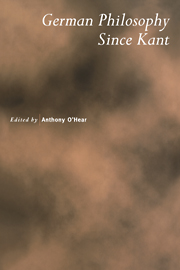Book contents
- Frontmatter
- Contents
- Preface
- Notes on Contributors
- Fichte and Schelling
- Hegel's Critique of Foundationalism in the ‘Doctrine of Essence’
- Schopenhauer's Pessimism
- Karl Marx
- Nietzsche's Virtues: A Personal Inquiry
- Bolzano, Brentano and Meinong: Three Austrian Realists
- Vorsprung durch Logik: The German Analytic Tradition
- German Philosophy of Mathematics from Gauss to Hilbert
- The Revolution of Moore and Russell: A Very British Coup?
- Husserl's Concept of Being: From Phenomenology to Metaphysics
- Frege and the Later Wittgenstein
- Otto Neurath, the Vienna Circle and the Austrian Tradition
- Does the Nothing Noth?
- Reactionary Modernism
- Adorno on Disenchantment: The Scepticism of Enlightened Reason
- Habermas, Science and Modernity
- German Philosophy Today: Between Idealism, Romanticism, and Pragmatism
- The Career of Aesthetics in German Thinking
- Hermeneutic and Analytic Philosophy. Two Complementary Versions of the Linguistic Turn?
- Index of Names
Husserl's Concept of Being: From Phenomenology to Metaphysics
Published online by Cambridge University Press: 29 September 2009
- Frontmatter
- Contents
- Preface
- Notes on Contributors
- Fichte and Schelling
- Hegel's Critique of Foundationalism in the ‘Doctrine of Essence’
- Schopenhauer's Pessimism
- Karl Marx
- Nietzsche's Virtues: A Personal Inquiry
- Bolzano, Brentano and Meinong: Three Austrian Realists
- Vorsprung durch Logik: The German Analytic Tradition
- German Philosophy of Mathematics from Gauss to Hilbert
- The Revolution of Moore and Russell: A Very British Coup?
- Husserl's Concept of Being: From Phenomenology to Metaphysics
- Frege and the Later Wittgenstein
- Otto Neurath, the Vienna Circle and the Austrian Tradition
- Does the Nothing Noth?
- Reactionary Modernism
- Adorno on Disenchantment: The Scepticism of Enlightened Reason
- Habermas, Science and Modernity
- German Philosophy Today: Between Idealism, Romanticism, and Pragmatism
- The Career of Aesthetics in German Thinking
- Hermeneutic and Analytic Philosophy. Two Complementary Versions of the Linguistic Turn?
- Index of Names
Summary
Western philosophy since Kant has been essentially operating within a Kantian anti-metaphysical paradigm. German-language philosophy, and a fortiori Husserl's phenomenology, is no exception to this. Here I argue that despite his putative eschewal of metaphysics in the phenomenological reduction or epoché Husserl deploys an ontological, even fundamental ontological, vocabulary and may be read as a metaphysician malgre lui. To the extent to which this interpretation is viable, one escape route from the critical paradigm would seem to be opened up.
Individual and real being
Husserl alters what he calls the ordinary concept of reality to facilitate a distinction between two kinds of being:
the ordinary concept of reality needs a fundamental limitation according to which a difference between real being and individual being (temporal being simpliciter) must be established (Ideas I, p. xxi)
It is not yet clear what the sense of ‘real’ is ordinarily or in Husserl's amended use but it is clear that the extension of ‘real’ is being restricted. Ordinarily, or pre-phenomenologically, one might be inclined to regard ordinary spatio-temporal particulars as real, perhaps as the paradigm case of reality, but Husserl is inviting us to give up this assumption. The limitation of ‘real’ he is talking about is, then, at least a limitation of scope or extension.
- Type
- Chapter
- Information
- German Philosophy since Kant , pp. 209 - 222Publisher: Cambridge University PressPrint publication year: 1999

